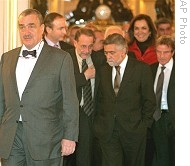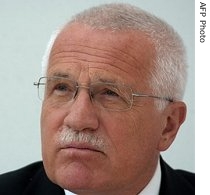VOA标准英语2009年-Czech Republic to Face Many Challenges During E(在线收听)
 |
| Czech Foreign Minister Karel Schwarzenbergher (L) arrives followed by counterparts at urgent meeting of EU foreign ministers to discuss Gaza crisis, in Paris, 30 Dec 2008 |
The Czech Republic takes over the helm of a European Union that is battling its worst financial and economic crisis in its 50-year history. Many countries are already in recession or - in the case of France, just skirting recession. And the economic forecast for 2009 promises more bad news.
Relations between the EU and Russia are also at a low point after a brief war last August between Russia and Georgia. Brussels and Moscow have only begun taking the first steps to put them back on track.
There is also the question of the EU's Lisbon Treaty, aimed at reforming and streamlining the 27-member bloc. Prague has not yet ratified it and Czech President Vaclav Klaus remains deeply skeptical of it - and of the European Union in general. He has also refused to fly the EU flag from his residence and opposes the EU's climate change treaty.
 |
| Czech President Vaclav Klaus gives a press conference on the last day of the 14th annual summit of Central European presidents in Brno, 26 May 2007 |
Although Mr. Klaus has a largely ceremonial post - most of the political power lies with the prime minister and his government - he may be hosting an EU summit in March.
Altogether, says Philip Whyte, an analyst at Chatham House - a London-based think tank - the upcoming Czech presidency will be a difficult one.
"The problem with the Czech Republic is twofold. One is that there is quite a strong, euroskeptic strain within the Czech Republic. And the second is that it is the first time it's actually chaired the EU... it only joined in 2004. And it will be doing it at a time when the foreign and economic policy challenges facing the EU are immense," said Whyte.
Prague also takes over from a strong presidency - France - and a number of observers believe it will may have a hard time providing the same vigorous leadership. But analyst Philippe Moreau Defarges believes the country will do its job at the EU helm.
"When you are the president of the European Union, you have a job to do. And it's clear the Czech Republic must do its job - organize meetings and so forth. And the fact that Czech public opinion is euroskeptic doesn't matter. It must do its job," he said.
The Czech government says it will focus on three E's during its presidency: the economy, energy and external relations - with a focus on the economy.